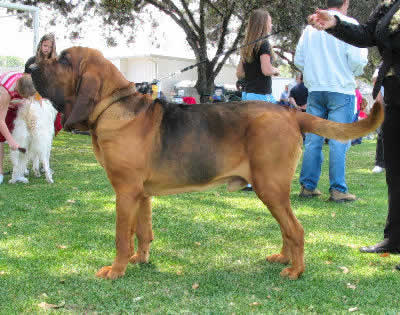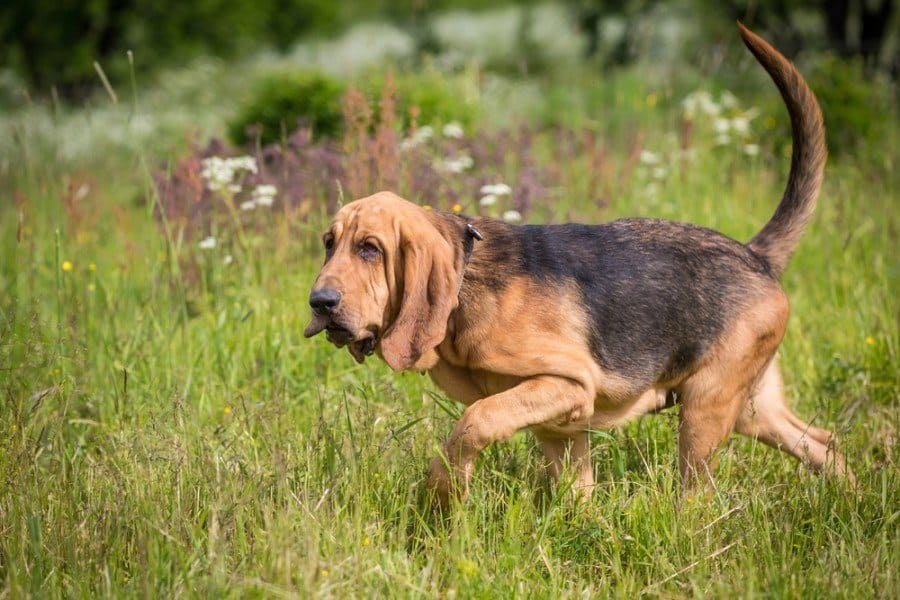
The large stocky Bloodhound, specifically bred to track humans, is very gentle and affectionate with people, though as a puppy may play a bit rough with children.
Although they were bred as working dogs, Bloodhounds make great companions. They are very affectionate and easygoing, and they have boundless energy. Bloodhounds suffer from few hereditary disorders, but when selecting a dog it is wise to check bloodlines for ailments such as hip dysplasia. They may also have eye, skin, ear, or gastrointestinal problems.
- Kingdom: Animalia
- Phylum: Chordata
- Class: Mammalia
- Order: Carnivora
- Family: Canidae
- Genus: Canis
- Species: lupus familiaris
Common Name(s)
Bloodhound, St. Hubert Hound, Sleuth Hound, Chien de Saint-Hubert, Flemish Hound
Breed Type
The Bloodhound is a superb scent hound. Bred specifically to track humans, it has been the origin of a number of hunting scent hounds including coonhounds and foxhounds.
Background
The Bloodhound’s roots began in France. The breed was refined by the monks of St. Hubert in Belgium, thus the common names St. Hubert Hound and Chien de Saint-Hubert. There was once a white variety of the Bloodhound, but this strain died out in the 1600s.
Description
The Bloodhound is a large dog with loose, wrinkly skin, large jowls, and long ears. Its muzzle is also long, and the dog is quite muscular. Bloodhounds may be black and tan, liver and tan, or red and tawny. Males are usually 25-27 inches high and weigh 90-100 pounds, while females are 23-25 inches tall and 80-100 pounds.
Care and Feeding
The Bloodhound diet should consist of poultry, wheat, brown rice and avocado. Two or three small meals each day are best for the Bloodhound, as the breed is prone to bloat and other gastrointestinal problems. Bloodhounds are relatively easy to groom, with their short hair requiring little more than regular grooming with a hound glove. Baths should only be given when necessary. The Bloodhounds ears require regular cleaning and inspection.
The Bloodhound needs yearly checkups to stay healthy. Vaccinations should be administered on the following schedule:
- 6-8 weeks: Distemper, Leptospirosis, Hepatitis, Parainfluenza, Parvo, and Corona virus (DHLPPC)
- 10-12 weeks: Second DHLPPC
- 14-16 weeks: Third DHLPPC and rabies
- Annually: DHLPPC and rabies booster
Bloodhounds shed moderately, and they have the trademark hound odor. Regular vacuuming and shampooing of carpets is essential.
Housing Your Dog
Bloodhounds are usually kept outside, but they may live inside so long as they get sufficient exercise. They need a soft bed to help prevent calluses on their joints.
Social Behaviors
Bloodhounds are very gentle dogs, and they get along well with humans, including children. Puppies, however, may play too roughly for small children. They do very well with other pets, although they may get aggressive toward dogs of the same sex.
Handling and Training
Training a bloodhound requires a great deal of patience, as they have minds of their own. They may not do well with obedience training.
Activities
The Bloodhound needs plenty of vigorous exercise. It is best to keep them on a leash during daily walks, because they often try to track down scents. A fenced-in yard would provide a safe place to exercise.
Breeding/Reproduction
Potential mates should be checked for hip dysplasia, heart disease, and eye, ear, and skin problems. Their bloodlines should be checked for the same.
Common Health Problems
A common ailment of Bloodhounds is gastric dilatation volvulus, or bloat. This is a serious condition that needs immediate treatment. This condition is often life threatening, so it is important to recognize its signs and get the animal to a veterinarian as quickly as possible.
Availability
Bloodhounds are not as readily available as most breeds. If you can’t find a local breeder, however, you can locate one online. Prices average from $500 to $800.
References
“Bloodhound“, Wikipedia, Copyright 2008
“Bloodhound“, Dog Breed Info Center, Copyright 1998-2008
Cusick, William D., “What to Feed a Bloodhound“, Referenced online, 2008
Welton, Michelle, “Bloodhounds: What’s Good About ‘Em? What’s Bad About ‘Em?“, Copyright 2000-2008
“Bloodhound Puppies for Sale“, Copyright PuppyFind.com, LLC, Referenced online, 2008
Featured Image Credit: Edoma, Shutterstock
